Success story: Bennett Elementary School
School District: Bellevue
School Location: Bellevue
Began participating in the Green Schools Program: September 2009
Level One of the Green Schools Program: Achieved in June 2010
Level Two of the Green Schools Program: Achieved in April 2011
Level Three of the Green Schools Program: Achieved in April 2012
Waste reduction and recycling (level one)
- During 2009-10, Bennett Elementary created a new Green Team comprised of staff, students, administration and interested parent volunteers.
- The school’s recycling rate increased from 50 percent to 61 percent after recycling was expanded and food scrap collection was started in the cafeteria. The PTA worked with the Green Team to help set up recycling in the cafeteria. The City of Bellevue partnered with the Green Schools Program to assist Bellevue schools with recycling improvements.
- Garbage collection service was reduced as a result of new waste reduction and recycling practices.
- A “Go Green Week” was held three times during the year to promote recycling and waste reduction. Activities included classroom conservation pledges, “bring your own plate day” for lunch, litter pick up in the schoolyard, teacher read-out-loud environmental book and a campaign to encourage walking, carpooling and bicycling to school.
- The student Green Team accomplished the following:
- Placed reuse paper boxes in all classrooms and offices to promote writing on both sides of paper.
- Held classroom workshops about recycling.
- Created a rap about lunchroom food scrap collection to help teach students and staff how to sort recyclable materials, compostable materials, and trash during lunch.
- Promoted waste free lunches, including the following messages: “Take or bring only what you will eat” and “Bring your lunch in reusable containers or lunch sacks.”
- Managed worm bins and created a worm bin display for the science fair.
- Shared the 3-Rs – reduce, reuse, recycle – at a PTA meeting.
- Helped collect recyclable and reusable items on field day.
- Encouraged staff to carpool by reserving parking slots for carpool vehicles only.
- Campaigned for pet owners to “Scoop it, bag it and trash it” as part of the City of Bellevue’s program to keep pet waste out of local streams, lakes and wetlands.
- Purchased and maintained “lifecycle” kits to share information with students.
- Prepared an eco-news DVD in which student reporters discussed environmental facts and tips that continuously ran in the school entryway for visitors and students.
- To reduce waste, the school did the following:
- Set up a bin for reusable art supplies.
- Circulated staff and parent newsletters by e-mail.
- Used whiteboards and smart boards in classrooms to limit paper use.
- Used leftover paper for tablets or printing on the unused side.
- Used durable dishes, cups and metal silverware in the staff room.
- Held “no new paper days” to promote reducing paper use.
- Environmental tips were included in parent newsletter and during morning announcements. The parent newsletter included information about reusable containers and reducing lunch waste.
- The school recycles printer cartridges and batteries.
- During 2010-11, a City of Bellevue guest speaker visited to promote waste reduction and recycling, and the City set up a booth about waste reduction and recycling at the school’s Science Fair.
- Three second-grade classes participated in the “healthy habitat” workshop.
- The school signed up for a waste reduction and recycling assembly to educate students and staff on what is and is not recyclable.
- In 2011-12, two third grade classes participated in the City of Bellevue’s “Rethink and Reuse” workshop and the Eco-Kids green team took a field trip to the Cedar Hills Landfill.
Environmental education
- At the start of the 2009-10 school year, the PTA sponsored a “Go Green” walkathon, which featured booths and displays about composting, energy reduction tips and other conservation practices.
- Each classroom selected the name of an endangered species as its team name.
- Students learned and participated in environmental games during physical education.
- To reinforce the three R’s – reduce, reuse, recycle – the school created large bulletin boards with charts and pictures about conservation.
- Teachers utilized forest and field space behind the school for environmental education lessons.
- The 2009-10 “Go Green” year ended with a “Go Green” field day, featuring stations, activities, and booths that fostered environmental awareness, knowledge and fun.
- In 2010-11, to promote their club and environmental practices, the Eco Kids made and wore t-shirts about waste reduction and recycling.
- On Arbor Day, Eco Kids participated in an Earth Day field trip and tree planting program at the Bellevue Botanical Garden.
- Eco Kids are part of Cougar Mountain zoo’s “living classroom” program.
- Eco Kids set up a booth for science fair night to promote environmental awareness.
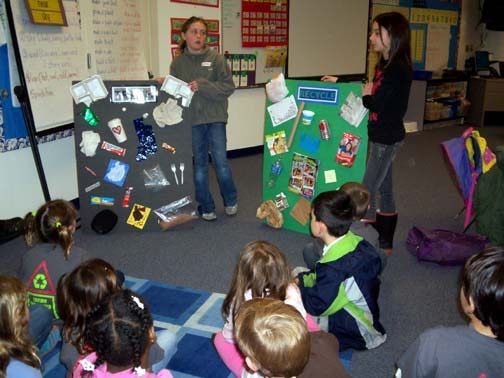
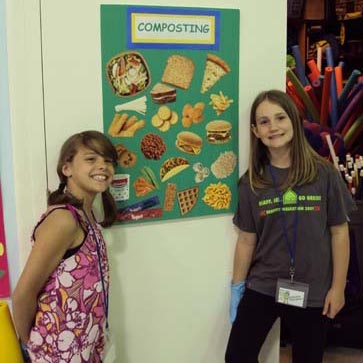
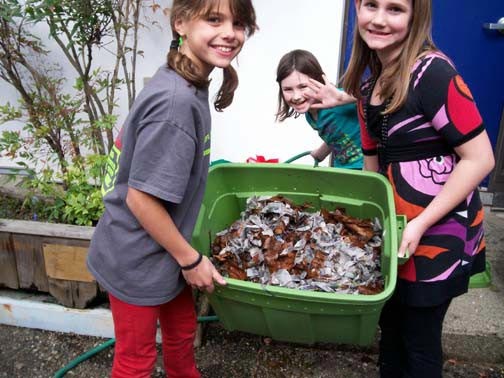
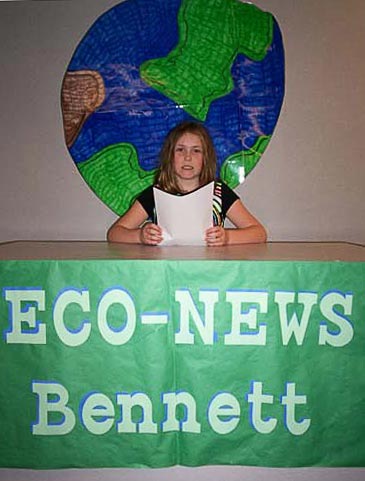
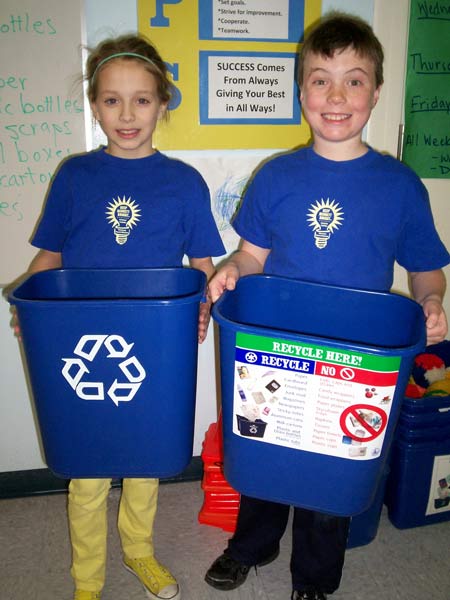
Energy conservation (level two)
- During 2009-10, students completed energy-saving checklists, and the school held a half–hour, school–wide blackout to help teach students and staff about the value of conserving energy.
- During 2010-11, students started an energy conservation patrol to monitor classrooms for the “Big 5” — lights, TV/VCR, projector, smart board and computers — to make sure they are turned off when not needed.
- Students placed energy conservation labels near all light switches in the school.
- Bellevue School District’s energy conservation manager presented at a staff meeting about school energy use.
- Eco Kids developed songs about energy conservation and sang songs on morning announcements to promote green practices.
- Eco Kids participated in the Watt Watcher program. They developed laminated cards for each room that were turned over if any lights, computers, printers, TVs or smart boards were left on. They called these “the Big Five.”
- Staff worked with IT to adjust computer shut down schedule to turn off electronic equipment earlier, when possible.
- Students made videos and broadcast morning announcements about energy conservation and other resource conservation actions throughout the year.
- Watt Watchers tasks were added to classroom job lists so that each room has a student designated to turn off lights, computers and smartboards, or to remind teachers to do so.
- Students monitored which electrical items used the most power. They found that holiday lights were using a large amount of energy and encouraged staff and students to reduce use of these lights.
- Wendy Shol, staff and leader of Eco Kids, created a Watt Watcher bulletin board with tips about conserving energy.
- In 2011 and 2012, staff invited the City of Bellevue to set up the Carbon Yeti booth at their science fair to promote energy and water conservation.
Water conservation and pollution prevention (level three)
- The Eco Kids are working with “Live Ocean” to learn about water quality.
- In 2011 and 2012, staff invited the City of Bellevue to set up a poo-lution booth at the science fair to promote proper disposal of pet waste. A booth about clean streams also was set up.
- Four Three fourth grade classes participated in Nature Vision’s “Healthy Water Systems” workshop.
- Classes received the “Water Cycle Game”
- Fourth graders used the City of Bellevue’s water conservation curriculum materials.
- The green team used the water conservation resource tub from the City of Bellevue.
- Students placed “turn water off” stickers by sinks throughout the school.
- Students put up posters throughout the school to promote water conservation.
- To raise awareness about conserving water at school and at home, morning announcements were submitted to the front office and read to the school. Announcements were also published in the PTSA Friday Flyer website.
- The Eco-Kids club made a video on “water tips” for school and home to help educate the school and community on water conservation.
- Daily “green activities” were sponsored and took place at the school during Earth Day week. Activities included class pledges, using reusable water bottles, a used battery drive, and a “Pet Waste Campaign.”
- Bennett’s Science Fair was held during Earth Day week and Eco-Kids were encouraged to present a green project. Eco-Kids also entered a project about water conservation.
- All timed faucets in the school were checked and recorded for output.
- The Eco-Kids club learned about the water cycle from a Nature Vision presentation, and then made terrariums.
- Eco-Kids participated in a “home survey” on water consumption and created water conservation bumper stickers that were placed throughout the school.
Award
- Wendy Shol, teacher, received a King County Earth Hero at School award in April 2009 for her work with the Nike Reuse-A-Shoe Program and Puget Sound Save the Whales project.
For more information about the school’s conservation achievements and participation in the Green Schools Program, contact:
Bennett Elementary School
425-456-4800


 Translate
Translate
